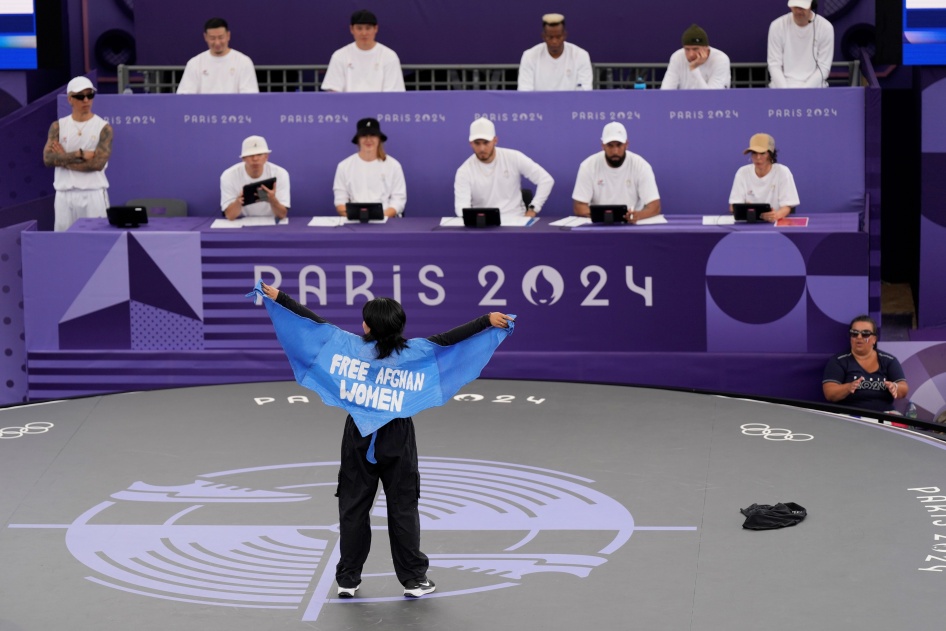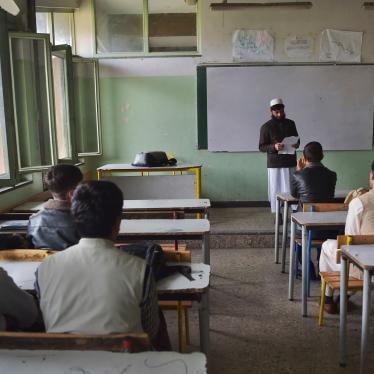(Nyon) – The disqualification of the Olympic breaking athlete Manizha Talash for promoting gender equality should be overturned and remedied, the Sport & Rights Alliance said today. Talash, an Afghan refugee breaker known as “b-girl Talash,” was disqualified from the Paris 2024 Olympics’ breaking competition on August 9 after she competed wearing a cape that said “Free Afghan Women.”
The International Olympic Committee (IOC) should stop using Rule 50 in the Olympic Charter to punish athletes for standing up for universal values of equality, inclusion, and respect, the Alliance said. Rule 50 has long been used by sport governing bodies in the Olympic movement to sanction athletes advocating for social justice and human rights causes. In some cases, these sport governing bodies have later acknowledged and congratulated such athletes for their advocacy.
“When athletes speak out for causes of justice and equality, they are human rights defenders and deserve protection and solidarity,” said Ginous Alford, director of sport and human rights at World Players Association. “The Paris 2024 Olympics have claimed to be the first ‘Gender Equal Games’ – so it is shocking then to punish an Olympic refugee team member for promoting precisely that during the competition. This case shows how Rule 50 can endanger athletes’ human rights to free expression and how its inconsistent application makes it even more alarming and confusing for athletes who are human rights defenders.”
Talash, a 21-year-old from Afghanistan representing the Olympic Refugee Team, was disqualified during her prequalifying battle on August 9. Talash fled Afghanistan in 2021, after her team received threats and were forced to practice at home due to worsening conditions under Taliban rule. Now living in Spain, Talash was “given a special berth to compete” by the IOC as “part of efforts to shine a spotlight on the estimated 100 million people who are forcibly displaced around the world.”
“At the third anniversary of the Taliban takeover, the crisis for women’s rights is the worst in the world. As a result, 20 million women and girls in Afghanistan are still suffering. Sports are still forbidden for all female athletes and the Taliban are refusing to reverse the ban on women’s sports,” said Friba Rezayee, one of Afghanistan’s first two Olympian women and the founder and executive director of Women Leaders of Tomorrow. “Given that all three women on the Afghan Olympic National Team – and two out of the three men – are living in exile, Talash should not have been disqualified for a simple call for women’s basic human rights.”
The World DanceSport Federation, the Lausanne-based governing body for breaking, said Talash was disqualified for “displaying a political slogan on her attire in violation of Rule 50 of the Olympic Charter.” Due to her defeat in the prequalifying battle, Talash would not have advanced to the next round even without being disqualified.
“Women’s freedom in Afghanistan is a human rights concern and universal cause that everyone at the Olympics should be able to support,” said Khalida Popal, former captain of the now-exiled Afghan Women’s National Football Team and executive director of Girl Power Organization. “Manizha Talash should be honored for her courage, if sport is to embody the values of dignity, peace, and respect for human rights that are enshrined in the Olympic Charter.”
Since taking power in Afghanistan in 2021, the Taliban have created what Human Rights Watch calls “the world’s most serious women’s rights crisis” by acts including banning girls and women from attaining secondary and higher education, violating women’s right to freedom of movement, banning women from many forms of employment, and barring women and girls from playing sports.
“Athletes do not surrender their human rights in competition, including to speak out on women’s rights,” said Minky Worden, director of global initiatives at Human Rights Watch. “Manizha Talash has already faced discrimination and hardship just for being an Afghan woman, and her statement at the Paris Games aligned with the Olympic Charter’s recognition of the importance of human rights.”
Talash is a human rights defender and cultural rights defender as well as an athlete, the alliance said. In her statement on Instagram following her disqualification, Talash also makes solidarity statements with athletes, such as Basket Pour Toutes, fighting the hijab ban in French sport and promotes the counter-culture origins of break dancing. International human rights standards protect human rights defenders like Talash. The role of nonstate actors in protecting human rights defenders can be found in documents such as the 2019 Swiss Guidelines on Human Rights Defenders, issued by the Federal Department of Foreign Affairs of Switzerland, where the IOC and World DanceSport Federation are headquartered.
“Manizha Talash’s brave and powerful statement at the Olympics took place almost exactly three years since the Taliban took control of Afghanistan and began to silence the voices and aspirations of the country’s women,” said Samira Hamidi, Amnesty International’s regional campaigner for South Asia. “Now, more than ever, we need to hear and amplify the voices of Afghan women on every stage and every platform, including the Olympic Games. No one can be expected to remain ‘neutral’ in the face of such systemic discrimination, and no athlete should be reprimanded simply for supporting Olympic values of gender equality.”
***
The Sport & Rights Alliance’s mission is to promote the rights and well-being of those most affected by human rights risks associated with the delivery of sport. Its partners include Amnesty International, The Army of Survivors, Committee to Protect Journalists, Football Supporters Europe, Human Rights Watch, ILGA World (The International Lesbian, Gay, Bisexual, Trans and Intersex Association), the International Trade Union Confederation, and World Players Association, UNI Global Union. As a global coalition of leading nongovernmental organizations and trade unions, the Sport & Rights Alliance works together to ensure sports bodies, governments, and other relevant stakeholders give rise to a world of sport that protects, respects, and fulfills international standards for human rights, labor rights, child wellbeing and safeguarding, and anti-corruption.









